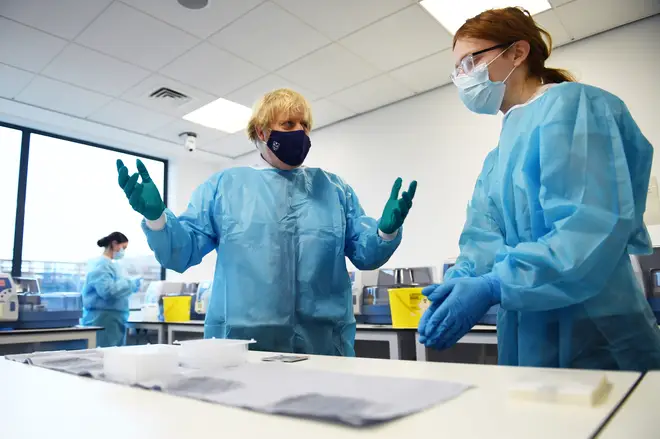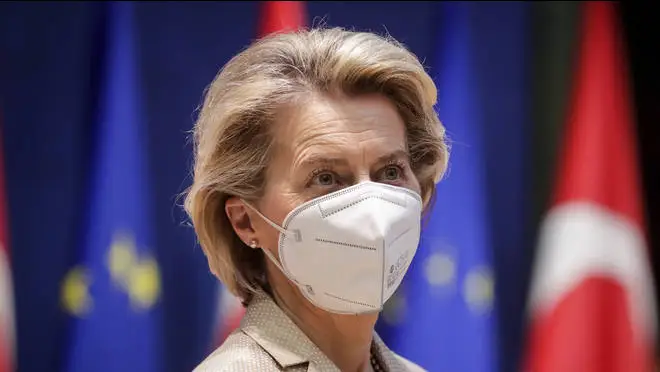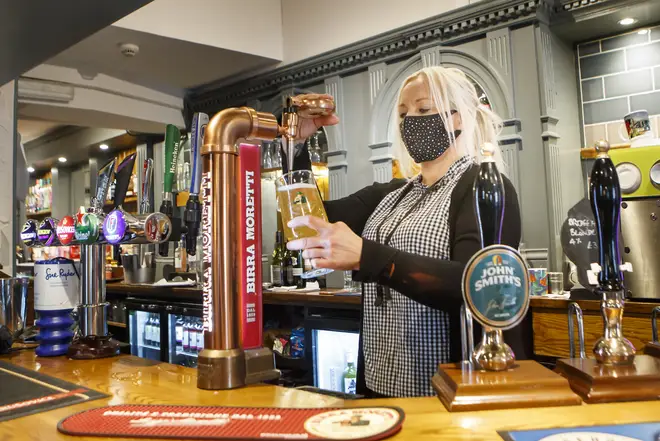
Vanessa Feltz 3pm - 6pm
24 March 2021, 18:18 | Updated: 24 March 2021, 18:42

Ben Kentish latest on Liaison Committee grilling
Boris Johnson has faced uncompromising questions from MPs on the handling of the Covid crisis, acknowledging that at the start of the pandemic there were "all sorts of things" that were not understood about the virus.
In a series of responses during a tense 90 minute appearance in front of the Liaison Committee, the prime minister said:
Read more: 'Capitalism' and 'greed' behind UK vaccine success, PM says
Read more: EU calls for tougher controls on vaccine exports
Boris Johnson said he felt “Test and Trace has been an extraordinary achievement,” but added: “If you said to me did they get everything right the first time? No, that is not surprising.”
The PM defended the program when pressed on the £37 billion price-tag, telling the committee: “80 per cent of the spending goes on labs, on testing, on giving people the results that they so desperately need.
“It is that massive testing operation that allows us to know where the disease is prevalent, what type of variant it may be.”

He added: “It is thanks to NHS Test and Trace that we know whether the disease is going up and down in localities and that gives us the tools to fight it.
“It has been absolutely indispensable.”
The prime minister was repeatedly asked about whether he regretted the decision to ease restrictions over Christmas, which was then reversed for large swathes of the country at the last minute.
However, Mr Johnson said while he had many regrets, that was not one of them, telling MPs: “Yes it was tough, but I think it was the right thing to do."

Boris Johnson asked what mistake he regrets most during pandemic
“Of course I regret all the disruption to people’s lives, the loss of education, the effects of lockdown, the loss of business, the loss of earnings.
“Nobody in my position could conceivably have had to take the decisions that I have taken and not regret it, of course I do.”
But when it came to Christmas, he said: “I think it was the right thing to do in the light of the evidence we had.”
Watch again: PM faces grilling from MPs in wake of Covid vaccine ‘greed’ comment
The PM took a more cautious approach when questioned by Jeremy Hunt about whether the UK would take retaliatory action in response to any vaccine export blockade by the EU.
It followed calls from the European Commission, just hours earlier, for tougher controls on exports to Britain and other countries that are doing well with their vaccination process.
Mr Johnson did not rule out a response, saying the government “will do everything necessary that we can” to ensure the vaccine rollout continues in the UK.

However, he warned the "long-term damage" of blocking vaccines or vaccine components could be "considerable".
"The partnership we have with our European colleagues is very, very important, we continue to work with them," he told MPs.
"I would just gently point out to anybody considering a blockade or an interruption of supply chains that companies may look at such actions and draw conclusions about whether or not it is sensible to make future investments in countries where arbitrary blockades are imposed."
Boris Johnson was also forced onto the defensive under furious questioning from Home Affairs Committee chair Yvette Cooper, who demanded to know why the 20,000 hauliers who enter the UK from France each week are not being tested for Covid.
“You have two to three thousand new cases a day of the South Africa and Brazil variant in France and in some parts of France it is over 30 percent of the cases,” Ms Cooper said.
“Hauliers going to France are being tested, you know that system works, why are you not testing hauliers coming back into the UK?”
Read more: Boris Johnson warns UK will 'feel the effects' of Covid third wave
Read more: Trust in Oxford-AstraZeneca vaccine safety plunges in Europe amid blood clot scare

Tougher border measures with France could be introduced 'very soon', Boris Johnson says
In response, the prime minister said “more stringent measures” would create trade delays and “people should be under no illusions that it would have consequences".
However, he added: "We will take a decision, no matter how tough, to interrupt that trade, to interrupt those flows, if we think that it is necessary to protect public health and to stop new variants coming in.
"It may be that we have to do that very soon."
Read more: Tighter borders with France could be introduced 'very soon', PM says
In a hint at what the "new normal" could look like, Boris Johnson said the requirement for coronavirus vaccination certificates could be left to individual hospitality venues.
Analysis: Why rebel Tories say the data for lifting lockdown is on their side

Boris Johnson: Individual pubs may be left to decide on Covid vaccine passports
Asked if such a certificate could be required for the pub, the PM told the Liaison Committee: "I think that that's the kind of thing - it may be up to individual publicans, it may be up to the landlord."
He said "the basic concept of vaccine certification should not be totally alien to us”, highlighting that surgeons are required to have a vaccine against Hepatitis B.
“My impression is there is a huge wisdom in the public’s feeling about this,” Mr Johnson added.

“The public - human beings instinctively recognise when something is dangerous and nasty to them and they can see that Covid is collectively a threat.
“They want us, as their government, and me, as their prime minister, to take all the actions I can to protect them and that is what I have been doing for the last year or more.”